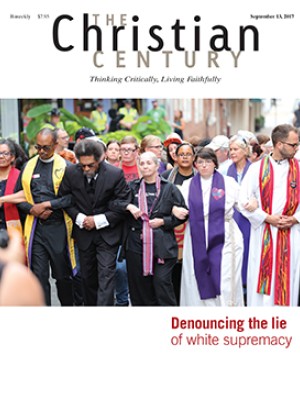October 8, Ordinary 27A (Philippians 3:4b-14; Matthew 21:33-46)
The Apostle Paul shows the struggle to transcend the architecture of ego.
Many people know modern architecture’s axiom “form follows function.” Coined by Chicago architect Louis Sullivan around the turn of the last century, the phrase captures the idea that the purpose of a building should shape its design. Buildings are not to be monuments or things of beauty alone; the aesthetic experience of the structure is not of primary importance. Function is primary.
The apostle Paul was no architect. Yet this axiom could well have been his own. In the passage from Philippians for this week, Paul is clear that all that has built him up—his education, training, and status—are of little importance unless they are in service of his life in Christ.
Read our latest issue or browse back issues.
It is not that Paul thinks his background is bad. There is nothing inherently wrong with worldly accomplishments, and Paul actually seems quite proud of all that he has become. We do need our architecture of ego, containers of our identity. We need to have a sense of who we are before we can become who we were meant to be.
But there comes a time in our spiritual formation when this architecture of identity must be held up against the greater goal and purpose of our living. (This is one of Richard Rohr’s great insights, especially in Falling Upward.) If the architecture of our ego is not contributing “to wanting to know Christ,” as Paul says, then we would do well to step beyond it. It can become a distracting ornamentation at best, or at worst a barrier to our journeying toward Christ—the function and purpose of our lives.
We see this so beautifully in the passage from Philippians. The contours of Paul’s life are being shaped by his longing “to know Christ and the power of his resurrection.” As such, his life has taken on a new form. It is no longer an edifice of his own making, but instead it is being formed as he pursues what he knows now to be the purpose of his life: to know Christ and share the good news with the world. And while this new life is not without suffering, it has also brought him a lightness of being and a peace the world cannot give.
Stepping out from behind the architecture of our ego and letting our lives begin to be shaped by a desire to know Christ and the power of his resurrection—this does not come easily. I have had many heartbreaking conversations in which people lament that they are not the pillar of faith they think they ought to be. They are not scrubbed up, ornamented, beautiful monuments of faith, and the gap between what they are and what they think they should be is often filled with shame, self-loathing, and pain.
It breaks my heart, because more often than not these people are the very same ones who I see as living the gospel most faithfully. They are some of the most generous, loving, service- minded, self-forgetting people I know. And yet when they look at themselves, all they see is what is lacking in their edifice of faith—an edifice that they believe they alone are responsible for constructing.
This happens not just with individuals, of course, but also with the church. We can get so caught up pointing to what needs to be fixed, what is not working right, and what needs to change that we can forget the very reason we exist in the first place. We can get so caught up with the form our church is taking that we can forget our function, our purpose.
Several years ago, Matt Fitzgerald gave the sermon at my installation. I will never forget what he said. He said that if anyone is wondering whether or not there is a God, they should be able to answer in the affirmative by looking at the church. I continue to be stunned, challenged, and set free by that statement.
But isn’t that exactly what the doctrines of sanctification and justification teach us? Are we not alive in this world not to prove our worth or earn our salvation, but because of the good news we are to embody and share? And are we not then to let our lives be formed and shaped by this sharing of the good news as we continue to learn and lean into it? Isn’t it as marvelously simple, and profoundly challenging, as that?
In the Gospel passage, the tenants in Jesus’ parable have gotten it so profoundly wrong. There they are, guarding the form and forgetting the function. They are so invested in keeping the vineyard for themselves that they have forgotten what it is really for. The vineyard was never theirs. It was lent to them so that they could do good work in it. Our lives and our churches are not really our own, either. They are gifts from God, lent to us so that we may be of service to them and to God. Too much time, energy, and suffering have been spent fortifying the form while forgetting the function.
Maybe Paul was an architect after all. He had the vision of building the church not as an ornamental edifice but as a body. A living, breathing, serving, beautiful yet broken body that wants nothing more than “to know Christ and the power of his resurrection.” I wonder what form our lives and churches would take if we could share in Paul’s vision?





